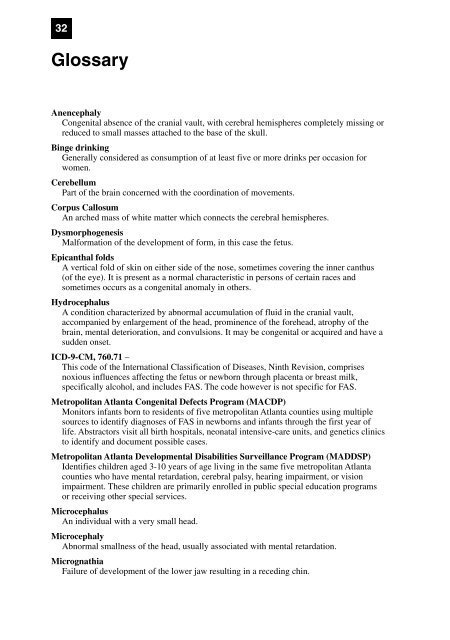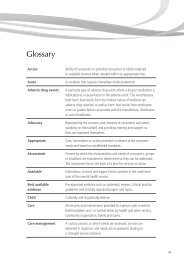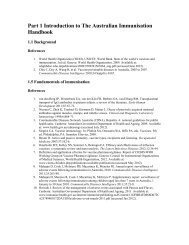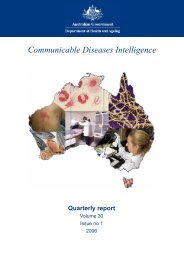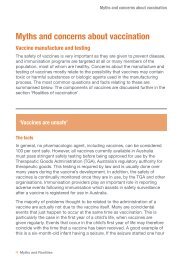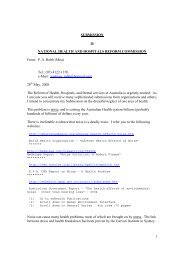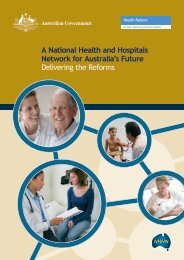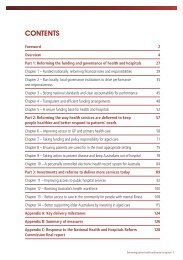Fetal Alcohol Syndrome A literature review - Department of Health ...
Fetal Alcohol Syndrome A literature review - Department of Health ...
Fetal Alcohol Syndrome A literature review - Department of Health ...
You also want an ePaper? Increase the reach of your titles
YUMPU automatically turns print PDFs into web optimized ePapers that Google loves.
32<br />
Glossary<br />
Anencephaly<br />
Congenital absence <strong>of</strong> the cranial vault, with cerebral hemispheres completely missing or<br />
reduced to small masses attached to the base <strong>of</strong> the skull.<br />
Binge drinking<br />
Generally considered as consumption <strong>of</strong> at least five or more drinks per occasion for<br />
women.<br />
Cerebellum<br />
Part <strong>of</strong> the brain concerned with the coordination <strong>of</strong> movements.<br />
Corpus Callosum<br />
An arched mass <strong>of</strong> white matter which connects the cerebral hemispheres.<br />
Dysmorphogenesis<br />
Malformation <strong>of</strong> the development <strong>of</strong> form, in this case the fetus.<br />
Epicanthal folds<br />
A vertical fold <strong>of</strong> skin on either side <strong>of</strong> the nose, sometimes covering the inner canthus<br />
(<strong>of</strong> the eye). It is present as a normal characteristic in persons <strong>of</strong> certain races and<br />
sometimes occurs as a congenital anomaly in others.<br />
Hydrocephalus<br />
A condition characterized by abnormal accumulation <strong>of</strong> fluid in the cranial vault,<br />
accompanied by enlargement <strong>of</strong> the head, prominence <strong>of</strong> the forehead, atrophy <strong>of</strong> the<br />
brain, mental deterioration, and convulsions. It may be congenital or acquired and have a<br />
sudden onset.<br />
ICD-9-CM, 760.71 –<br />
This code <strong>of</strong> the International Classification <strong>of</strong> Diseases, Ninth Revision, comprises<br />
noxious influences affecting the fetus or newborn through placenta or breast milk,<br />
specifically alcohol, and includes FAS. The code however is not specific for FAS.<br />
Metropolitan Atlanta Congenital Defects Program (MACDP)<br />
Monitors infants born to residents <strong>of</strong> five metropolitan Atlanta counties using multiple<br />
sources to identify diagnoses <strong>of</strong> FAS in newborns and infants through the first year <strong>of</strong><br />
life. Abstractors visit all birth hospitals, neonatal intensive-care units, and genetics clinics<br />
to identify and document possible cases.<br />
Metropolitan Atlanta Developmental Disabilities Surveillance Program (MADDSP)<br />
Identifies children aged 3-10 years <strong>of</strong> age living in the same five metropolitan Atlanta<br />
counties who have mental retardation, cerebral palsy, hearing impairment, or vision<br />
impairment. These children are primarily enrolled in public special education programs<br />
or receiving other special services.<br />
Microcephalus<br />
An individual with a very small head.<br />
Microcephaly<br />
Abnormal smallness <strong>of</strong> the head, usually associated with mental retardation.<br />
Micrognathia<br />
Failure <strong>of</strong> development <strong>of</strong> the lower jaw resulting in a receding chin.


